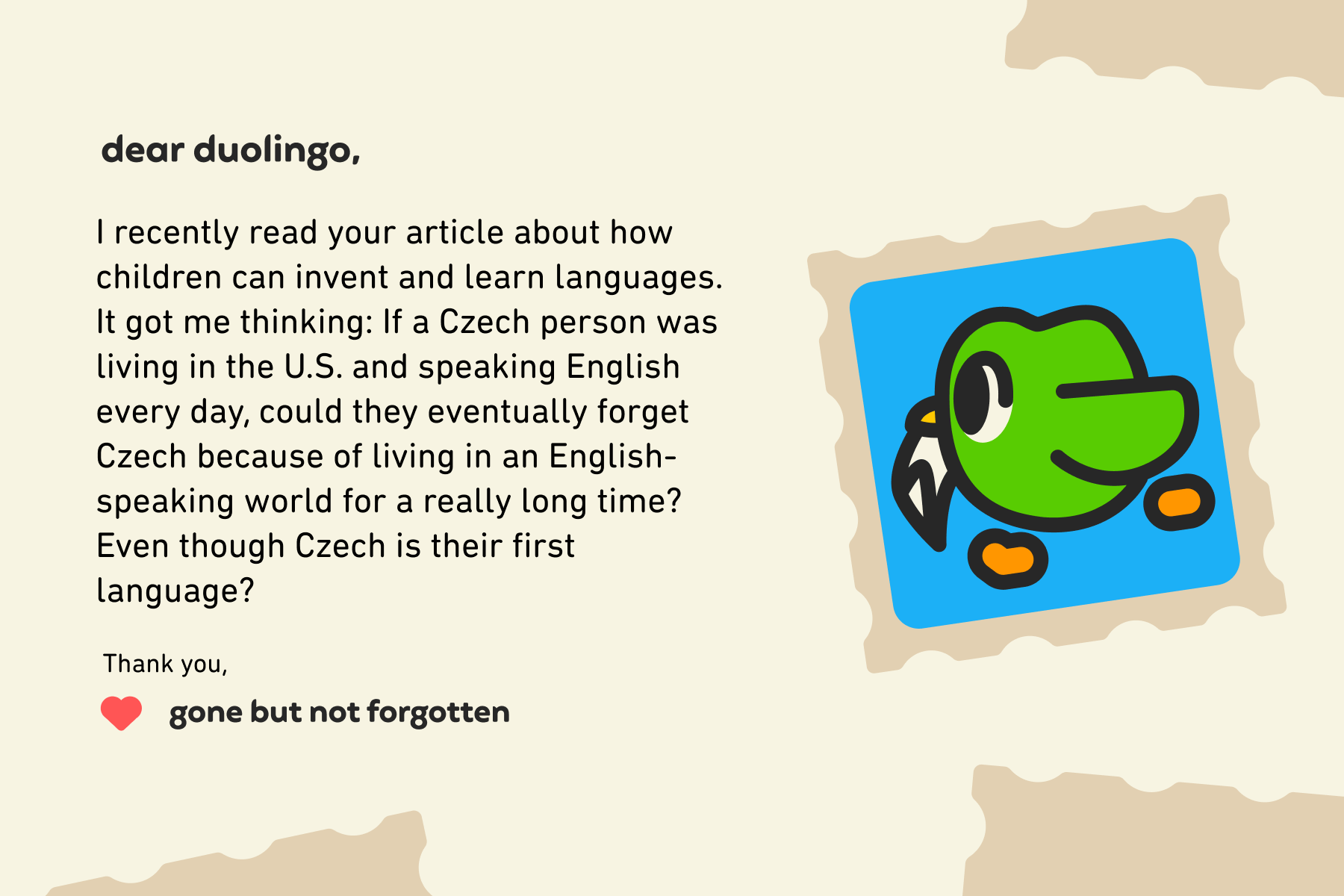Welcome to another week of Dear Duolingo, an advice column just for learners. Catch up on past installments here.
Hello, dear learners! I'm taking over Dear Duolingo this week to dig into a question that is the opposite of what you've come to expect from this advice column. See if you agree:

This is a great question. We talk a lot on this blog about language learning, but we haven't yet covered language forgetting. It's also a natural process, one that can happen to anyone—even if you're using the language every day!
So how does this happen? Why does this happen? And what can be done about it?
(Don’t worry—there's good news at the end of the post.)
What does it mean to forget?
When we think about a piece of knowledge, we sometimes think about it as something that’s either there or not there. Like a sock in the dryer, it just might disappear someday into the Great Sock Void, and then it can’t be recovered.
But that’s not really how knowledge works. Knowledge is less like a sock and more like a house: If you don’t regularly tend to a house, it’ll start to fall apart in small, incremental ways—a lost shingle here, a broken floorboard there. But the house itself will stay standing for a very long time.
Language forgetting is like this: a very gradual process that happens over many years. Someone who isn’t using a language forgets individual words far more quickly than they forget grammar and pronunciation, and the ability to understand a language will stick around a long time even if someone loses their ability to speak it.
And, shockingly, this can happen even if you use the language every day. 🤯 As we go through different life phases, we converse more or less about certain topics with different groups of people, including in different languages—and as a result, the "language" that lives in our heads evolves daily. (And that includes our first language changing due to our new language, too. 🤯🤯) So we’re constantly picking up—and, yes, forgetting—new vocabulary and grammar.
Who can forget a language?
The surprising answer? Anyone.
People of any age can forget a language. However, research shows that children forget a language faster and more completely than an adult does.
One way this has been studied is by looking into the language abilities of people who were adopted as children and stopped hearing or using their first language entirely. For example, research with people adopted from Korea found that they were no better able to recognize Korean sounds than people who never learned Korean at all. However, adoptees are able to re-learn their first language a little faster—so there is something still there in their brain!
In comparison, people who emigrate to a new language community as adults and stop using their mother tongue regularly *do* hold onto the language in their brains. This is true for second languages, too: If you learn a new language as an adult, your brain can hold onto it tightly—as long as you've learned it to a moderately high level of proficiency.
How can you avoid forgetting a language?
There are a number of factors that help your brain hold onto a language, even when you’re not around people who use it:
How we feel about our language.
A strong, positive emotional connection to a language helps protect against forgetting it—while strongly negative emotions (like stress, anxiety, or trauma) towards a language accelerate the process of forgetting.
Prior proficiency levels.
The stronger your existing language knowledge, the more resilient it is against being forgotten. This is also true with a language you’re learning: the higher your proficiency level, the more likely you are to retain it over time!
Your community.
If you’re surrounded by people who use and value the language you speak, you’re more likely to hold onto it.
Your level of need.
Having a reason to use the language–like for a job, commerce, volunteering, or friend—helps with language retention.
Bilingual education.
This is a really, really big one. A lot of well-meaning people think that a kid who immigrated recently to the U.S. will benefit if they’re forced to speak only English. They think that this will result in faster language acquisition. However, bilingual education—where kids have classes in both the language of the country they’ve moved to and the language they grew up with—is associated with dozens of benefits, from higher ultimate achievement to better mental health. Kids with access to bilingual education grow into happier, healthier adults who have rich expressive abilities.
Language learning is an unforgettable journey!
Forgetting a language, even your first language, can happen, but fortunately there are ways to protect against it. Science has also shown that relearning a semi-forgotten language is much faster than learning it from scratch. So don't be discouraged—even if your language ability isn't as strong as it used to be, you can always un-forget it!
For more answers to your language and learning questions, get in touch with us by emailing dearduolingo@duolingo.com.



